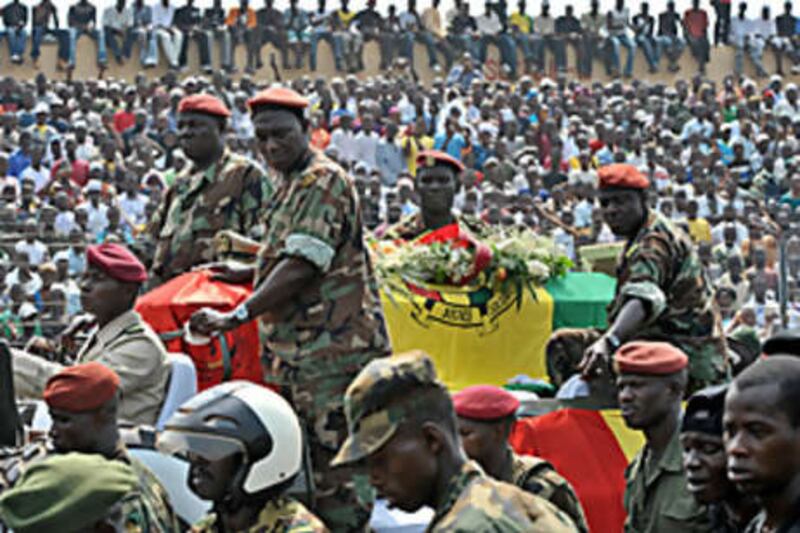As Guineans prepared to bury their former leader yesterday, the country's new military rulers sought to appease international and domestic concern they would continue Lansana Conté's political legacy of repression, rampant corruption and economic mismanagement. Despite several bloody uprisings against his rule in the past several years, thousands of Guineans turned out, along with regional leaders, to pay their final respects to the autocrat. Police beat back mourners trying to enter the funeral hall with sticks and belts. Capt Moussa Dadis Camara, the coup leader, however, was conspicuously absent from the funeral.
Conté's coffin, draped in a red, yellow and green national flag, was first displayed in the People Palace's in the capital Conakry, where the presidents of neighbouring Liberia, Sierra Leone, Guinea-Bissau and Ivory Coast attended a formal ceremony. It was then taken to a packed national stadium, where members of the junta were acclaimed by the crowds, who included female mourners dressed in white. The body was due to be transported later to Conté's north-west hometown of Moussayah, where he was born around 1934.
In the four days since the coup, Capt Camara has promised to lead a campaign against nepotism and graft in Guinea, which Transparency International this year placed among the 10 most corrupt countries in the world. He has also pledged to hold elections in 2010 and improve living standards for the West African nation, in which 63 per cent of the population lives below the poverty line despite vast mineral resources, according to Unicef.
The coup leaders announced on Thursday they would hold an "informational meeting" today for "representatives of civil society, political parties, religious faiths and unions", as well as a separate meeting for representatives from the United Nations, African Union, European Union and Group of Eight meant to "reassure the international community". Since Capt Camara's sudden rise to the presidency from his obscure post as manager of a fuel depot, Guinea's civilian leadership has acquiesced to the new head of state. Ahmed Tidiane Souare, whom Conte appointed as prime minister in May, as well as about 30 other civilian and military leaders met with the self-declared president on Thursday, when they told Capt Camara they were at his "complete disposal".
"We thank you once again for your wisdom, Mr President," Mr Souare told Capt Camara in the presence of journalists. The international community, however, has been less obliging. France, which ruled Guinea from 1890 to 1958, expressed alarm that Guineans should have to wait two years before the next elections, in which Capt Camara has promised not to run. Meanwhile, the United States offered a stern condemnation of the coup and demanded an immediate return to civilian government.
mbradley@thenational.ae





